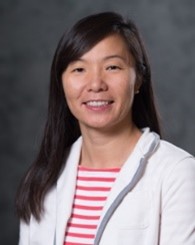 Prof. Lucy Zhang
Prof. Lucy Zhang
Department of Mechanical, Aerospace & Nuclear Engineering
Rensselaer Polytechnic Institute
Friday, Oct. 28th at 3pm
Room 3550 MEK
Sid & Marian Green Classroom
ABSTRACT: This is a two-part talk. In the first part, I will discuss computational strategies for multiphysics systems. Multiphysics involve multiple physical behaviors to be coupled for inter-related responses. To obtain stable, effective, and accurate coupled numerical solutions is not trivial. Traditional methods that are available in commercial software often generate numerical instabilities. To simulate and analyze engineering applications involving multiphysics require robust simulation strategy and computational tool. I will present immersed computational technique for multiphysics modeling and as a numerical framework. Finally, I will demonstrate its capability by show casing several energy and biomedical applications involving fluid-structure interactions, solid-solid interactions involving high impacts, and acoustics-fluid-structure interactions.
In the second part of my talk, I will discuss funding opportunities within the Division of Civil, Mechanical, and Manufacturing Innovations (CMMI) for the mechanics research community, in particular in the Mechanics of Materials and Structures (MoMS) and Biomechanics and Mechanobiology (BMMB) programs. I will also present opportunities at various career stages, from graduate students, early-career, to mid-career faculty
BIO: Prof. Lucy Zhang is a Professor at the Department of Mechanical, Aerospace & Nuclear Engineering at Rensselaer Polytechnic Institute (RPI). She is now serving as a Program Director in the Mechanics cluster: Mechanics of Materials and Structures (MoMS) and Biomechanics & Mechanobiology (BMMB) programs within the CMMI Division at NSF. She is a Fellow of ASME. She received her B.S. from Binghamton University in December of 1997, obtained her M.S. and Ph.D. from Northwestern University, IL, respectively. She joined Mechanical Engineering Department at Tulane as an assistant professor. Due to Hurricane Katrina, she moved to Rensselaer Polytechnic Institute in 2006 and was later promoted to Associate Professor and Professor. Her research interests are building advanced and robust computational tools and software for accurate and efficient multiphysics and multiscale simulations that can be used for engineering applications in biomechanics, micro and nano-mechanics, medicine, and defense projects involving impacts. Her pioneer work in developing the Immersed Finite Element Method (IFEM) had been and is still being widely used in academic engineering and scientific communities. She is also the co-host of “This Academic Life” podcast series with Prof. Pania Newell at the University of Utah.